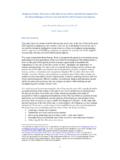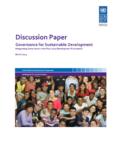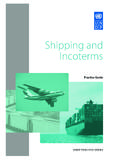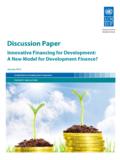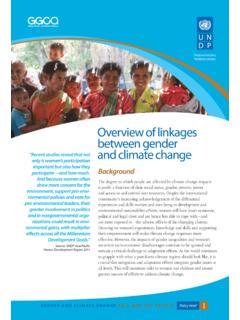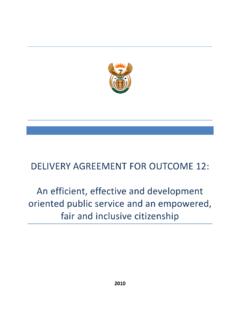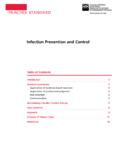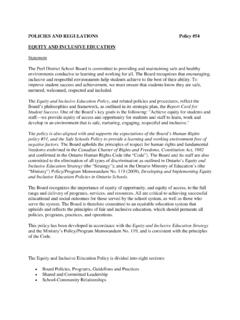Transcription of govErnancE principlEs, institutional capacity anD …
1 8 govErnancE Principles, institutional capacity and Quality The resilience of nations is manifest in their ability to anticipate and prepare for shocks, which, in turn, depends on the technical capacities of organizations and institutions at the front lines of crisis response, the overall functioning of country systems, and the govErnancE structures that set the rules of the game'. Photo: Tim McKulka/UN Sudan govErnancE Principles, institutional capacity and Quality Introduction During times of economic crisis, the resilience of nations is manifest in their ability to anticipate and prepare for shocks and effectively manage crises as they unfold.
2 The ability of governments to design and implement the right combination of short- and long-term policy measures is thus critical for sustaining MDG progress and building greater resilience over time. Determining the appropriate policy measures is complex, though. On the one hand, it requires specific technical capacities in the organizations and institutions at the front lines of the crisis response. On the other hand, it depends on the overall functioning of country systems and institutional qualities, including decision-making processes and consensus building among key stakeholders, the broader political economy dynamics, and govErnancE structures that largely set the rules of the game'.
3 This chapter identifies the institutional qualities and govErnancE principles that are critical for developing and implementing effective and equitable policy measures to mitigate the impact of economic crises. These institutional qualities are performance, adaptability, and stability; the main govErnancE principles are participation/inclusion, non-discrimination/equality and rule of law/accountability. Moreover, the key country systems that are involved in a crisis response, such as the civil service, procurement mechanisms, public financial management systems and monitoring and evaluation systems, need to incorporate and display these qualities and principles when responding to economic shocks.
4 Otherwise, the policy measures implemented will be either short-lived or unsustainable. When individual institutions or entire systems adopt a combination of these govErnancE principles and institutional capacities, governments boost their ability to formulate and implement effective anti-crisis measures that are also legitimate in the eyes of their citizens. These qualities and principles are mutually supportive: the govErnancE principles set the overall enabling environment and drive the capacity of institutions to perform better and respond to crises, while the key institutions involved in realizing these principles need to be effective, adapt to changing circumstances and priorities, and sustain results and efforts.
5 These key qualities and principles, when adopted by core country institutions, can help countries design and implement more inclusive policies and avoid implementing recovery measures that could erode social protection (such as cash transfers) and social services (such as health and education) (Sepulveda 2011). Determining the right' policy recommendations for improving govErnancE structures and institutional capacities so that countries are better equipped to respond to crises is complex. Depending on the extent of their development, countries require differing investments in capacities.
6 In the absence of institutional capacities and effective govErnancE , though, countries have relied on ad hoc, short-term measures to contain the impact of economic crises. Countries would do better to take a longer-term view when building their institutions, which include the civil service, oversight bodies ( , judiciary systems), public financial management and national procurement systems. By so doing, governments could better sustain their development gains, regardless of their political and historical backgrounds.
7 Without investments in such core structures and systems, countries may employ short-term measures (such as the establishment of task forces, coordination mechanisms and other similar institutional arrangements) that bring about quick gains, but that, not being systemically incorporated, leave countries ill-prepared in the (inevitable) event of future crisis. 270 Towards Human Resilience: Sustaining MDG Progress in an Age of Economic Uncertainty govErnancE Principles, institutional capacity and Quality institutional Capacities and Qualities Countries that strive to respond effectively to crises and to build resilience need adaptable, capable institutions.
8 A better understanding of how institutional capacities within countries form a building block for effective responses to economic shocks is essential for sustaining human development gains, including progress towards the MDGs. This section discusses the qualities necessary for institutions at the forefront of the crisis response, provides country evidence, and proposes measurements and recommendations. Institutions mentioned in this chapter are defined as formal organizations of government and public service, including government ministries and agencies, sub-national governments and other organizations of states responsible for public services, the design and implementation of policies, and the administration of the state's Defining institutional Qualities While institutional performance is the Performance.
9 Adaptability and stability are the three foundation of state capacity to function and qualities critical for any effective response to a crisis. fulfil its obligations towards its citizens, it is not While institutional performance is the foundation of a sufficient condition for countries that need state capacity to function and fulfil its obligations to respond to shocks and deal with a changing towards its citizens, it is not a sufficient condition for countries that need to respond to shocks and deal environment.
10 Building resilience also requires with a changing environment. Building resilience also institutions that are stable, yet adaptable. requires institutions that are stable, yet adaptable. Performance Performing institutions, with the capacity to deliver basic public services and to design and implement policies, are critically important to countries' efforts to achieve their development goals, and even more so during crisis. For example, the quality of govErnancE , as measured by the level of corruption and the quality of bureaucracy, can explain differences in the ability of public spending to improve health and education (Rajkumar and Swaroop 2008).

